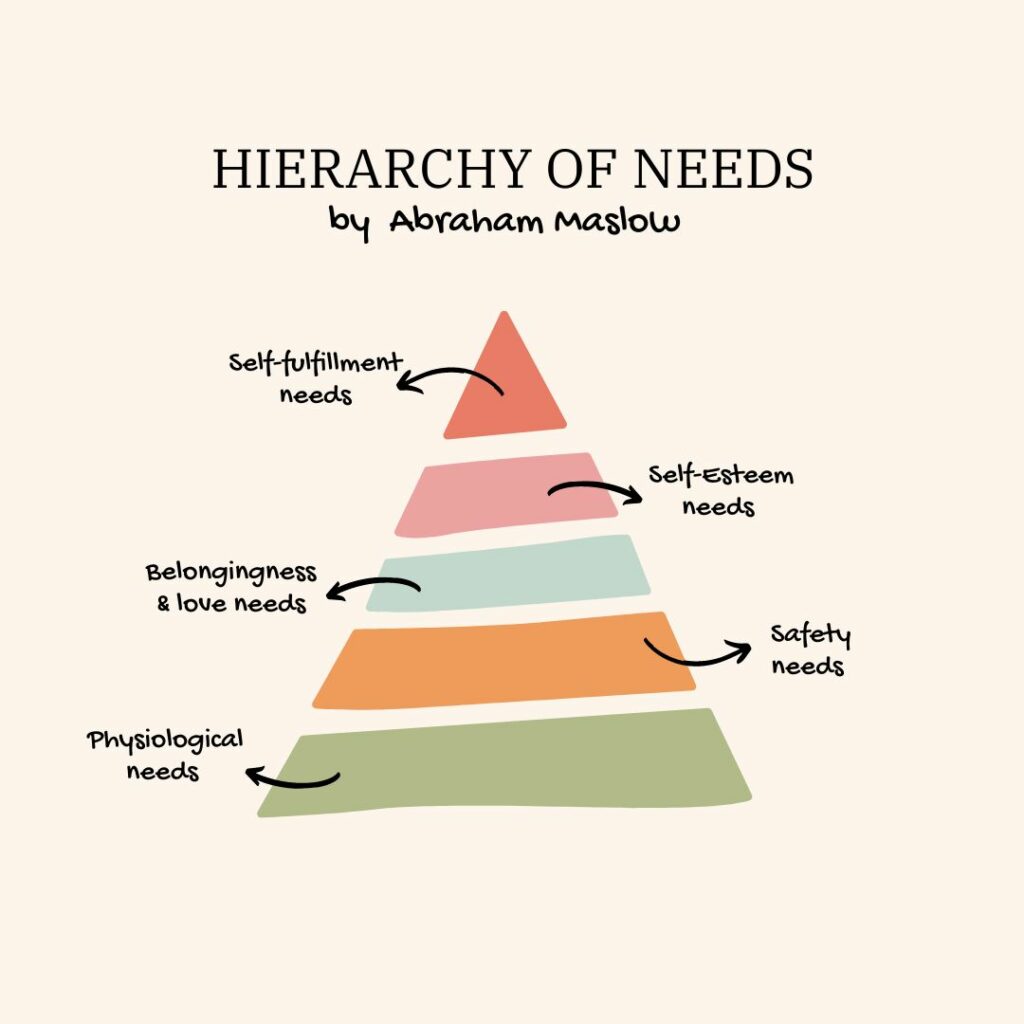What Do We Really Need for a Happy Life
Happiness. It’s a concept that has fascinated humanity for centuries. We often spend much of our lives in pursuit of it, sometimes without even understanding what it truly means or what we need to achieve it. Is happiness tied to material wealth? Is it found in personal success? Or does it stem from something much deeper, connected to our core human needs and desires? What is it that we truly need for a happy life?
In this post, we’ll explore the science-backed components of a happy life, beginning with Abraham Maslow’s famous hierarchy of needs and progressing into modern understandings of well-being, including the ‘Good Wants’ that fuel happiness and fulfillment. By the end of this post, you’ll have a clearer picture of what we truly need for a happy life, and, perhaps most importantly, what we need to do to cultivate it.
Maslow’s Hierarchy of Needs: The Foundation of Well-being
The concept of needs has been thoroughly studied, and perhaps the most famous theory of needs comes from psychologist Abraham Maslow, who proposed his Hierarchy of Needs in 1943. This theory suggests that humans are motivated by a series of hierarchical needs, beginning with the most basic, physiological needs, and moving up toward self-actualization, or the fulfillment of one’s potential.
Let’s break down Maslow’s pyramid of needs and understand why it’s so crucial for happiness.

Physiological Needs: The Non-Negotiables
At the foundation of Maslow’s hierarchy lie our physiological needs: air, water, food, shelter, and sleep. These are the essential requirements for survival. Without them, nothing else matters. Imagine trying to focus on personal growth or developing deeper relationships if you’re constantly hungry or sleep-deprived.
These needs are the very foundation upon which all other aspects of life rest. In the modern world, many of us have these basic needs met, yet we often overlook their significance. The next time you find yourself feeling stressed or anxious, check in with yourself: Are you getting enough rest? Drinking enough water? Your body’s basic requirements must be fulfilled for you to experience higher levels of happiness.
Moreover, in today’s fast-paced world, we are constantly striving for more — achievements, success, recognition — and it can feel like nothing we do is ever quite enough. This endless pursuit can often leave us feeling unsatisfied. That’s why it can be a grounding and comforting thought to realize that all we really need are air, water, food, shelter, and sleep. If you have all of these on any given day, you’ve already met the most fundamental needs for survival. In that sense, you’re already having a successful day!
This perspective helps reset the focus back to appreciating the basics, allowing space for higher levels of happiness to emerge.
Safety Needs: Feeling Secure
The next tier in Maslow’s pyramid is safety. Once our immediate survival needs are met, we crave stability and protection from physical and emotional harm. This includes financial security, health, and personal safety. A sense of security allows us to plan for the future and pursue our goals without constantly fearing for our well-being.
Interestingly, the need for safety also extends to psychological safety — feeling safe in our relationships, workplaces, and communities. When this need is met, we’re more likely to flourish and experience joy in everyday life.
Love and Belonging: Connection and Relationships
Once our physiological and safety needs are taken care of, we turn toward love and belonging. Humans are inherently social creatures. Relationships, whether romantic, familial relationships, or friendships, play a crucial role in our well-being. These connections provide us with a sense of belonging, emotional support, and companionship.
Happiness and personal growth are deeply tied to the quality of our relationships. In fact, studies in positive psychology and well-being show that strong social bonds significantly contribute to life satisfaction. To build happiness, prioritize nurturing meaningful connections with those around you. Remember that the nature of the relationship is less important, as is the number of social connections. In fact, having a close bond with a single person is much more important than having a hundred superficial friends.
Esteem: Confidence and Self-Worth
After fulfilling our social needs, we move toward esteem. This involves gaining respect from others as well as self-respect. We want to feel competent, confident, and valuable. When we achieve recognition, either through professional accomplishments or personal milestones, it boosts our sense of self-worth.
However, self-esteem doesn’t solely come from external achievements. True confidence stems from self-compassion, accepting who we are, and recognizing our intrinsic value beyond our accomplishments. External validation may lift us temporarily, but lasting esteem is built from within.
For instance, my grandfather spent much of his life craving external recognition, feeling as though he was never truly given the chance to achieve it. When he retired, his self-esteem faltered, as he measured his worth by the professional accomplishments he felt were lacking. It wasn’t until his 80th birthday, when the family celebrated him with great affection, that he realized his true success: he had raised a loving, supportive family. That realization helped him see that his worth extended far beyond what he initially sought through external validation.
In this way, esteem is about more than accolades—it’s about recognizing the value of who we are, not just what we do.
Self-Actualization: Realizing Your Potential
At the very top of Maslow’s hierarchy is self-actualization — the fulfillment of one’s potential and the realization of one’s purpose. Self-actualization involves personal growth, creativity, and the pursuit of meaning in life. This is where the journey becomes deeply personal. It’s no longer about survival or fitting in with others, but about discovering who you are and what your unique contribution to the world might be.
Many people mistakenly believe that happiness is something external that can be acquired, but in reality, happiness is part of this journey of self-actualization. When we engage in personal growth, find meaning in our actions, and live in alignment with our values, we experience profound happiness.

Beyond Basic Needs for Happiness: The ‘Good Wants’ We Need for a Happy Life
While Maslow’s pyramid of needs forms the foundation for a happy life, there are other key factors — or what psychologists like to call ‘Good Wants’ — that help us thrive and experience sustained joy. Unlike material possessions, money, beauty, or romance (read more about these ‘miswants’ here), these ‘Good Wants’ lead to lasting fulfillment. They are what we need for a happy life.
1. Signature Strengths
According to positive psychology research, using your signature strengths — the qualities that define you at your best — is key to well-being. When you engage in activities that allow you to use your strengths, you feel energized, motivated, and satisfied. For example, if one of your strengths is kindness, engaging in acts of kindness can bring you lasting joy and a sense of purpose.
2. Flow and Happiness
Another essential component of happiness is the state of flow. Flow is the experience of being fully immersed in a task that challenges you yet matches your abilities. When you’re in flow, you lose track of time and become completely absorbed in what you’re doing. Flow and happiness are closely correlated. This state brings not only happiness but also a sense of accomplishment and fulfillment.
To cultivate more flow in your life, engage in activities that challenge you while also allowing you to use your skills.
3. Generosity
Generosity is another key ingredient for happiness. Studies show that giving to others, whether through time, resources, or acts of kindness, boosts well-being. Generosity connects us to something larger than ourselves, providing a sense of purpose and fulfillment. Moreover, it nurtures positive relationships and creates a ripple effect of joy.
4. Experiences Over Material Goods
While it’s tempting to believe that acquiring material possessions will lead to happiness, research shows that experiences bring far more joy than things. When you invest in experiences — whether it’s travel, learning, or spending time with loved ones — you create lasting memories and emotional fulfillment. One key reason experiences bring greater happiness is their fleeting nature. Unlike material possessions that stick around and eventually become part of the background (think of those shoes you once craved but now barely notice), experiences are temporary, making us cherish them more. Their impermanence adds value, while material items quickly fade into the “new normal.” By choosing experiences, we enrich our lives in ways that objects simply cannot.
5. Growth Mindset for Happiness
The final ‘Good Want’ is a growth mindset. A growth mindset for happiness is vital, as happiness and personal growth are closely correlated. People with a growth mindset believe that their abilities and intelligence can be developed over time (a notion that is supported by science). This mindset encourages continuous learning, personal development, and resilience in the face of challenges. When we embrace a growth mindset, we become more adaptable and open to new opportunities, leading to a more fulfilling and happy life.
What We Need for a Happy Life – to DO Happiness
It’s important to remember that happiness is not a destination; it’s an action. Happiness isn’t something you acquire, but rather something you do through daily habits and intentional practices. Whether it’s using your signature strengths, practicing gratitude, engaging in acts of kindness, being generous, or simply savoring a moment of joy, these actions add up to create a life filled with happiness.
By building the habit of doing happiness regularly, you increase your chances of being happy consistently. As such, practicing intentional joy-boosting activities is what we need for a happy life.
Appreciating the Present Moment
Finally, let’s take a moment to appreciate the fact that you’re reading this article right now, which likely means that your physiological needs are met. You have access to air, water, food, shelter, and sleep. It’s easy to take these necessities for granted, but by practicing gratitude for having your basic needs fulfilled, you can significantly boost your happiness levels.
Pursuing happiness is part of self-actualization, the pinnacle of Maslow’s pyramid. The fact that you’re exploring ways to enhance your well-being suggests that you’ve already met many of your core needs, which is a tremendous achievement.

“At the core, we’re all living beings with simple needs. Air, water, food, shelter, and sleep — these essentials are all you truly need.” – 4HappyU
The Path to Self-Actualization
If you’re looking to deepen your journey toward happiness and wondering how to achieve self-actualization, our positive psychotherapy and coaching services can help. We can assist you to work through challenges, improve your well-being, and help you reach your fullest potential. Whether you’re looking to enhance your health, build self-esteem, or achieve a deeper sense of purpose, we’re here to support you every step of the way.
Resources
The information in this article is grounded in scientific research. If you’re interested in specific studies, feel free to reach out to us.
For daily doses of joy, positivity, inspiration, and motivation, be sure to follow us on Instagram.
Za naše bralce v Sloveniji
Če vas zanima več o psihoterapiji in iskanju trajne sreče, preberite naslednje članke: Psihoterapija Obala, 5 ključev do trajne sreče in notranjega miru, Najboljši psihoterapevti v Sloveniji: Kako se hitro spopasti s stresom, Psiholog v Kopru: Kako odpraviti težave s psihoterapijo in RTT terapijo, in Psihoterapija Online: Prednosti in učinkovitost terapije na daljavo.


